Review: FRINGE FESTIVAL 2024: FINAL ROUNDUP at Toronto Fringe
Fifteen shows from the final days of the Toronto Fringe
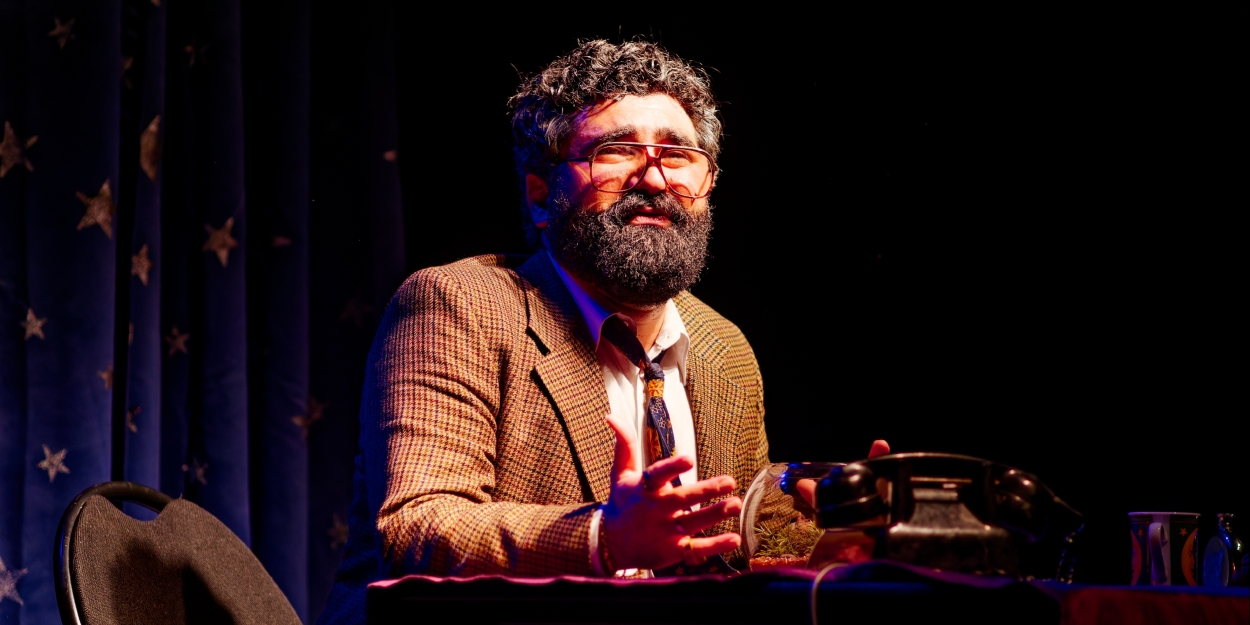
The Toronto Fringe’s 12-day extravaganza has concluded! Over 40,000 tickets were sold to 76 different shows around the city, from companies both local and international. With plenty of free arts programming at the Fringe Tent behind the Tranzac Club, the Fringe is a thrilling glimpse into the future of Toronto theatre.
BroadwayWorld saw 56 of the 76 shows. Here are the final 15 reviews from our time at the Fringe.
DEATH OF A STARMAN
Peter Mallcoh, Kay Komizara, and Zaid Bustami’s DEATH OF A STARMAN is a high-energy show about a TV astrologer, Sal Solomon, whose life has gone seriously Mercury retrograde; his ex-wife wants to kill him, he’s in debt to the mob, and any chance of true success seems to be behind him. Luckily, he’s got a few tricks up his sleeve in his attempts to exploit a gullible viewership.
Bustami effectively creates several distinct characters in a manic, always-moving solo performance. Once he’s created them and established their locations in the room, he could sustain a more natural conversational pacing by simply changing physicality, rather than taking time to cross the stage. The way he spins around to become a gangster’s henchman is a great example of using these character transitions to propel the story, and he’ll have a dynamite rhythm if he expands his transitional repertoire. Bustami’s story is cohesive, if silly, and a few funny videos sharpen the satire of Solomon as a conman who eventually goes full MAGA to appeal to conspiracy bros with fuller wallets than brains.
However, it’s never fully clear how much Solomon believes in his own merchandise, which muddies the satire; at moments, he’s a true believer, and at others, he’s a soulless charlatan happy to murder children for screen time. The larger political satire also starts too late in the game to feel fully effective. Bustami can carry the hour, though, and a few colourful props add visual interest to his animated turn.
Photo of Zaid Bustami by Ian Astorquizas
PAINTING BY NUMBERS
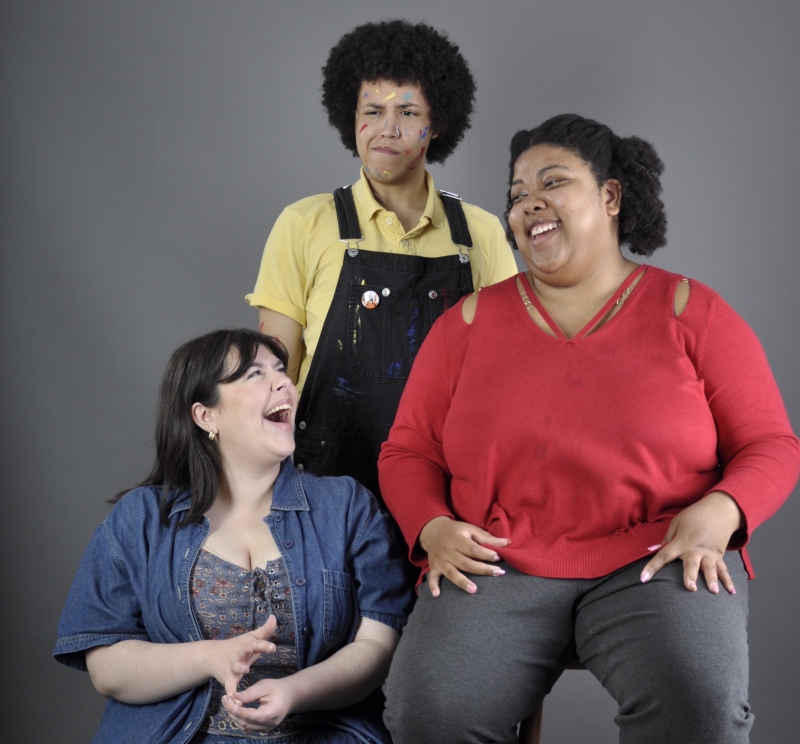
Judah Parris’ play looks at the nature of value and ownership of art, asking why an attached name or interesting backstory is more important to the work’s sale value than the skill or visual impact on display within the frame. The show itself is a work in progress, full of important ideas that have yet to completely coalesce.
The script has some complicated twists and turns, but struggles with basic logistical issues; for example, if our wealthy art collector is desperately trying to hide the fact that he has a mistress, why is he taking said mistress as his date to a highly-publicized event? As well, because a few characters have double identities and are deliberately pretending to be who they’re not, double-casting the remaining roles leads to some confusion—is this a double-cast actor, or another character in disguise?
Using real paintings created for the production by local artists adds significant visual panache to the low-budget show (the paintings are available for purchase, and a few were quite tempting). It’s a great way to make the world of the show feel larger, and to include a larger community of artists. Cassandra Henry’s confident stage presence and comic timing go a long way toward propelling the show forward in an entertaining way. And the resolution feels satisfying, even if you might have questions about how they got there.
Photo of Naomi Kaplan, Judah Parris, and Cassandra Henry by Rupert Lazarus
TONIGHT! A CLOWN WHO WANTED TO BE LOVED

Andrea Barello’s simple and sweet clown show is a slightly meandering but pleasant hour with the artist, a visitor to Toronto Fringe from Italy. The two sections of the show aren’t especially related, except through a healthy helping of audience participation. At first, Barello acts as a doctor, checking over the Tarragon Solo Room as if it’s his personal waiting room and examining audience members. It’s an object lesson in how far you can go with a running gag or two (such as the opportune use of a measuring tape) and a couple of well-timed words.
The second section feels far more germane to the title, as the clown invites several audience members into his home, one by one, seeking friendship or a date, only to have his plans for a more permanent connection not come to fruition. Barello’s playfulness with his audience costars is charming, and even though they’re in for some surprises, it never feels like they’re the butt of a joke. And the way he draws their portraits gives a new meaning to the term “tracing paper.”
Barello occasionally allows a joke to go on too long; for example, it’s not ideal to ask audience members to collectively hold a measuring tape out for 40 minutes, especially if it never factors back into the story; it feels like we were forgotten, rather than serving an integral purpose to the experience. But his sweet, winsome persona is sympathetic and engaging, and I hope he felt a lot of love from Toronto audiences.
Photo of Andrea Barello provided by the artist
BOY BOY AND THE MAGIC DRUM
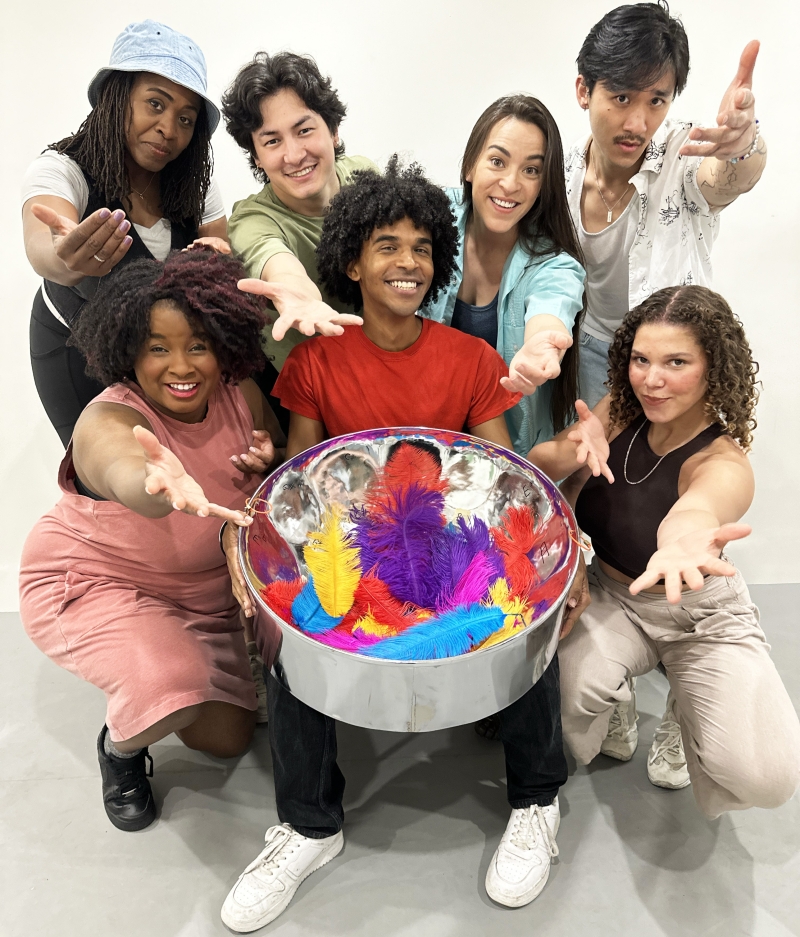
The winner of this year’s Adam’s Prize in musical theatre, Jewelle Blackman and Chantal Forde’s BOY BOY AND THE MAGIC DRUM is a sweet show based on Machel Montano’s children’s book. When a power outage threatens Carnival and the beloved Peace Parade, it’s up to shy 10-year-old Boy Boy (Gabriel Hudson) to save his Trinidadian town’s celebrations through the magic of steel pan and soca music.
BOY BOY’s strengths are its joyous music and proud Trini attitude. A song at the shop where townspeople buy costume fixings for the Peace Parade bursts at the seams with energy and sparkle; choreographer Deidrea Halley effectively arranges the large cast around the stage, making the town feel inhabited but not crowded. Its framing device of a sometimes distracted acting troupe putting on the show is fun and spices up the otherwise very simple story, but takes valuable time from character development. Boy Boy is the only defined character, and much of his personality is told rather than shown, though Hudson gives him an appealing charm. The ensemble creates beautiful music together, but some solos waver. However, it’s still an enjoyable, bright 65 minutes, and the running joke that Boy Boy’s magical benefactor (Robert Ball) always shows up exactly where he needs to be lands each time.
Photo of Astrid Atherly, Karen Jewels, Daniel Yeh, Gabriel Hudson, Siobhan Richardson, Randy (Lei) Chang, and Tkaia Green by Tim Cadeny
ON A SUNDAY IN AUGUST
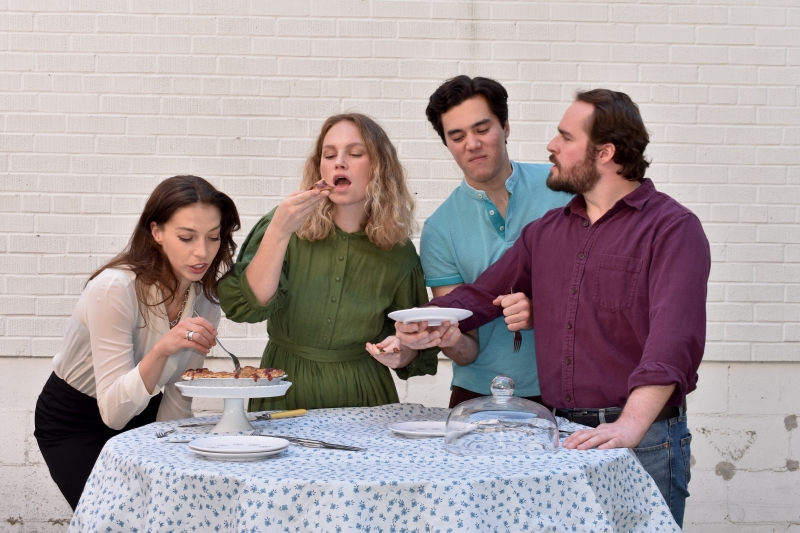
Olivia Quinn-Smith’s ON A SUNDAY IN AUGUST is an interesting and thoughtful family drama that deals with sibling relationships, inheritances of both property and illness, and the heavy responsibility of caretaking that can put a person’s life on hold. After the death of their parents, newly-sober Daniel (Cayne Kitagawa) returns to the family homestead to hear his sister’s proposal for selling it, so that each of the three siblings can start a new life, and Abbie (Ashley Dingwell) can get the degree she put on hold for five years while shouldering most of the parental caretaking responsibilities. The family meeting is met by hostility by Paul (Joseph Brown), who sees it as an ambush; he would prefer to keep the century-old property in the family and continue to use it as a farm. As much as he resents the idea, Paul needs to confront his own mortality, as he has tested positive for the same genetic disease that killed their father, and is already showing symptoms.
The complex family relationships are clearly defined with backstory; the characters and their interactions feel lived-in and realistic. A nicely painted backdrop sets us in a cheerful but dated, rustic homestead that seems designed to keep its residents in the past.
The promise shown by the script and company made me want to know what happened after the final bows. At the moment, while it sits satisfyingly enough as a one-act, it also feels like the first act to a more expansive work. I’d love to see this developed into two acts, where we see the results of the family’s rift and the decisions the characters make. In a more developed version, we could also see more from the outsider character Shelby; I never got a good sense of the realtor’s previous relationship with each member of the family, which might have been a rich vein to explore, potentially adding depth to the conflict. Eli-Bella Wood’s jittery, bubbly portrayal sets her apart from the rest of the family, but sometimes it also feels like she’s in a different play.
Photo of Eli-Bella Wood, Ashley Dingwall, Cayne Kitagawa and Joseph Brown provided by the company
UNMUTE

UNMUTE, presented by limbus work collective, is a devised theatre piece that explores increased anti-Asian sentiments in a post-COVID world. The thoughtful anthology includes scenes that are sadly familiar, such as an incident of hateful rhetoric on a Toronto subway, but also provide nuanced and interesting dialogues, such as three separate meetings between two Asian playwrights, a young writer and the established writer who becomes her mentor. The incensed youth believes that her elder must make a larger cultural comment and accuses her of relying on tropes or stereotypes; the older woman shoots back that she simply wishes to tell a unique story, and it’s not her responsibility to provide education or cultural lessons through art. The discussions are sometimes refreshingly surprising, looking at parent-child relationships, mental health, and gender and sexism.
The production could use more cohesive elements like the three scenes between the playwrights to bring its many ideas together, which are fascinating but not especially unified. Two scenes, one where a young woman resists her psychotherapist’s attempts to get to know her, and one where a young man attempts to force a female classmate to resign as president of the theatre club, are tense and intriguing but don’t quite know where to end yet, going on long enough that the tension is released prematurely. Performances are variable, and could be more consistent to fully bring these important thoughts to life.
Photo of the company of UnMute provided by the company
BARRY POTTER AND THE MAGIC OF WIZARDRY

A Harry Potter-themed magic show might feel a little dated in an era where many of us are grappling with J.K. Rowling’s increased vitriol about and funding of transphobic and other right-wing causes. However, Fringe regular Tim Motley (Dick Darrow) is presumably not sharing any of his sweet theatre festival cash with the book series’ author, and presents an accomplished, quietly impressive magic show with plenty of audience participation.
His gags and loosely connecting story, all Potter themed (he insists that the series was based on the life of “Barry Potter,” his character), are groan-worthy, and he knows how to work the crowd both when they land and when they don’t.
Motley effectively guesses what his audience volunteers are thinking, which is equally remarkable when he explains how he reached his conclusion and when he doesn’t. He plays the long game with misdirection in presenting his final trick, which both gives the hour structure and outfits it with a final flourish.
Image of Tim Motley by Andre Goosen with design by Germaine Chan
PATTY PICKER
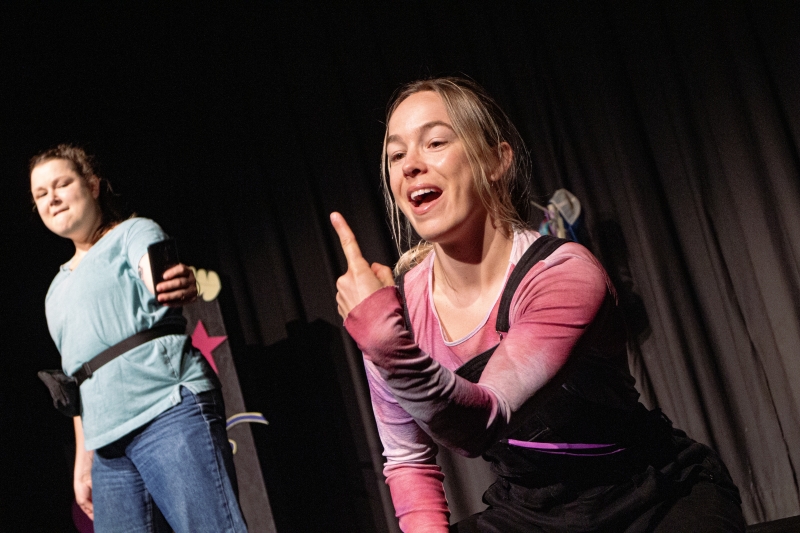
I almost didn’t see PATTY PICKER because of the title, and that would have been a real shame. Evan Bawtinheimer’s short, sweet comedy about a high school student who deals with bullying when her opponent for class representative leaks evidence that she uses nose-picking as a coping device for anxiety is an effective parable for young audiences about staying true to yourself and knowing your own worth.
Yes, there’s a lot of discussion of nose-picking, but it’s balanced by the well-roundedness of Patty’s character, Kaitlin Race’s perky performance, and her relationships with her girlfriend Phoebe, her divorced father Paul, and her nemesis Preston, all played with definition and sensitivity by Anne van Leeuwen, and Patty’s realistic responses to a situation spiraling out of her control.
The fun, bright costumes and backgrounds in Cass Van Wyck’s production underscore the bouncy rhythm and patter of Bawtinheimer’s alliterative script, which doesn’t sacrifice content or heart for the gimmick, but uses words starting with P whenever possible. The play’s potential provides positive payoff, particularly potent and poignant when Patty ponders her parents.
Photo of Ann van Leeuwen and Kaitlin Race by Matt McLaren
YOGA FOR BILLIONAIRES
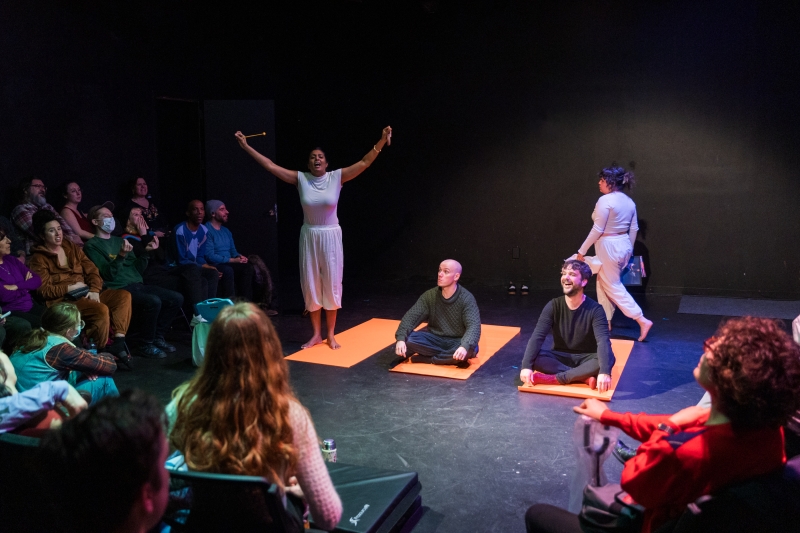
YOGA FOR BILLIONAIRES promises to manifest its participants cash in this fun show that satirizes the money-hungry and the appropriation of yoga by the rich and famous. Our guide (Sarah Raj) encourages the audience to participate in some of the seated stretches while she invites three participants up at a time to go through a routine that she guarantees will make you a clearer-headed, happier…okay, at least wealthier person, not afraid of stretching into your compatriots’ space and taking what you’re owed.
Raj imperiously manages the room, sassing the participants while speaking worshipfully about various wealthy personalities, editing herself into photos with “friends” such as Jeff Bezos. When she’s not firing off an insult, her dreamy, distracted delivery could use additional snap and bite, as it’s not quite dreamy enough to be a satire of that kind of speech and not quite crisp enough to fully keep the comic momentum. Picking up the pace and energy just a bit would help the jokes land more effectively, as well as more clearly contrasting with Lindita Kulla’s deadpan, abused assistant, who I wish had more to do.
When the two interact with audience participants, it’s a lot of fun, and most seem game for improv. Jokes about leaning in and capitalism are solid. The only issue is that, ultimately, the joke never really evolves or changes, meaning that YOGA FOR BILLIONAIRES is a good time but could stretch (get it?) itself further.
Photo of Sarah Raj and Lindita Kulla by Bjorn Bolinder
KOLI KARI
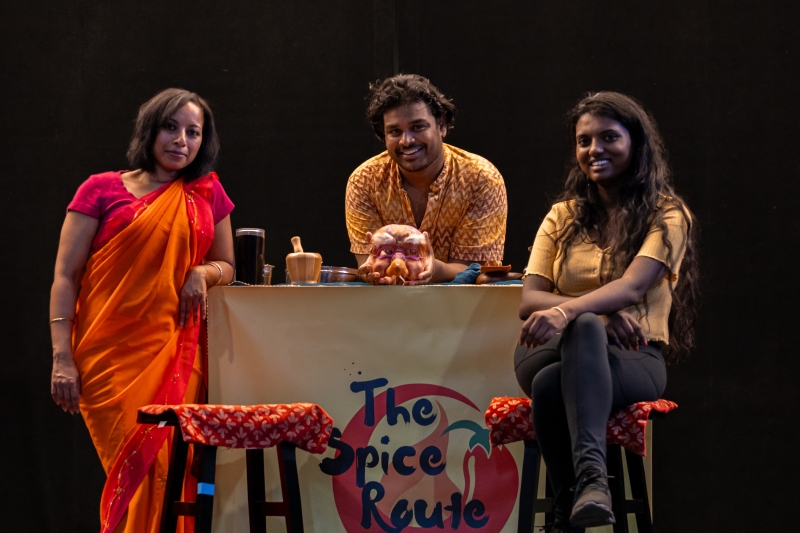
Ganesh Thava’s KOLI KARI is an intimate, flashback-heavy show that reaches into the past of a TV cooking show host (Thava), who after receiving a mysterious phone call is teaching audiences to make his mother’s koli kari, or chicken curry, in a special episode of his show The Spice Road. As he prepares the recipe his mother made him promise not to reveal, he’s haunted by visions of his former girlfriend, his mother, and the life he tried to escape.
The script of KOLI KARI is rich like its recipe in its development of themes and motifs, cleverly using repeated images and food-based metaphors to deepen the connections between the fragments it portrays. It simmers to produce a complex, flavourful result with some spice that might provoke a couple of tears. Even more excitingly, a small section of audience gets to sample the curry (in actuality, a vegetarian curry from a commercial kitchen heated on stage, which is probably safer).
The play could lean in more to its foray into magical realism with the chicken that haunts the chef's every move and serves as a kind of family emblem; it’s a great idea, but doesn’t progress much beyond the first visual impact. As well, the reveal feels a little tepid in the context of the layered buildup; the recipe might need to cook for fifteen more minutes or so. But it’s a promising, engaging effort, served with love and a tiny cup of curry.
Photo of Asha Ponnachan, Ganesh Thava, and Anne Saverimuthu by Barry McCluskey
TOBA TEK SINGH
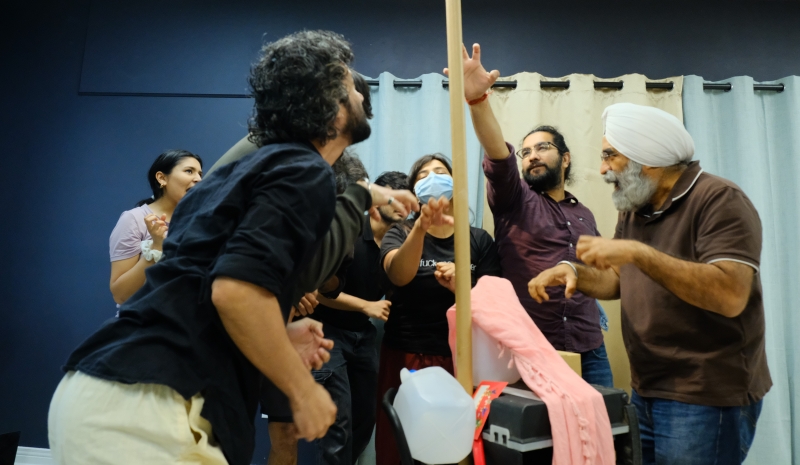
In 1947, the Partition of India divided the dissolving British Raj on the subcontinent into the independent nations of India, or “Hindustan,” and Pakistan. This decision threw many into turmoil and chaos, resulting in sudden mass migrations and an estimated one million deaths. Dramatic Jukebox’s production of TOBA TEK SINGH, adapted from Saadat Hasan Manto’s 1955 short story of the same name, movingly explores the dislocation and loss of this time through the perspective of a most vulnerable population, the inmates of a Lahore asylum. Many of the asylum’s patients already have a tenuous grasp on location and identity, and their lives face massive disruption as routines are shattered and inmates are moved to the location that best fits their religious background. Bishan Singh (Sarabjeet Arora) is Sikh and therefore due to be moved to India, but his hometown, Toba Tek Singh, belongs to Pakistan; when he discovers this disparity, his refusal to be moved creates a ripple effect of consequences.
Co-directors Deval Soni and Ethan Persyko manipulate a large cast on the even larger Al Green space to create some of the most successful stage pictures of Fringe 2024, assisted by Puja Karira’s earth-toned costuming and Abbey Kruse’s elegantly atmospheric, muted lighting. The actors’ physical work is almost dance-like at points, exploring questions of oppression and sanity through positioning and levels. The barely-linear experience is dreamlike, occasionally nightmarish, as characters face sexual assault, familial separation, and physical violence at the hands of officials who are supposed to protect them. The show is presented in a mix of Hindi, Punjabi, and English; to increase access, English subtitles, while not translating everything, provide valuable historical context and situating information that sharpens the satire.
Arora has a commanding presence and quiet dignity even when muttering angry nonsense that criticizes both sides of the border. We’re left pondering the question the show asks: Who is the sane one in this situation, and what does it mean to be deemed insane by those who create a senselessly hostile reality? A unique and intriguing Fringe experience.
Photo of Sarabjeet Arora, Shivam Sapra, Chhavi Disawar, Lakshita Khatter, and Parth Soni by Diego Barranco
DEAD RIGHT

Kate Barris and David Schatzky’s DEAD RIGHT is a family comedy about the right to choose when to die. When Helena (Janelle Hutchison) receives a damning diagnosis, she informs her daughter Suzanna (Kristi Woods) that her mother is going to end things on her own terms. Helena’s husband, Bud (Allan Price) has agreed to die with her, whenever that happens; Suzanna, who has just quit her job to work on a play, is horrified, and her husband Michael (Chris Gibbs), a psychiatrist who hides potato chips of varying quality around the house, is little help.
Director Briane Nasimok has a clear and unified tone of heightened silliness. This tone is particularly evident in flourishes such as everyone’s elaborate cellphone ringtones and the interstitial recorded song transitions, which list the various quirky items and topics in the scene we’ve just viewed like we’re watching a self-aware 1950s sitcom. While it didn’t tickle my funny bone, I appreciated the way these touches pulled together the show as a complete package. These strong fundamentals are a good match for the production’s accomplished cast and quippy dialogue.
The topic of assisted suicide in the face of declining health is rich and painful, and it’s a solid idea to address it from an unusual angle in comedic form. But the comedy requires a more foundational base in humanity to fully explore its theme, which often feels pushed aside in favour of “business” for the other characters. The characters can be afraid of discussing the tough subject, but the play can’t. I found myself drawn to the relationship between Helena and Bud, who has volunteered to join his wife in the unknown but finds himself reluctant to make the journey when the time comes, and I wanted to see more of their negotiations.
As well, there’s a meaningful connection to be made between the dependency of Michael’s OCD client, who calls him several times a day to confirm the time and date of their next appointment, Bud’s inability to conceive of life going forward without his wife, and Helena’s desire not to be a burden and go out on her own terms. I’d like to see the playwrights stitch together these ideas more clearly and elegantly, instead of looking beyond them for the next punchline.
Photo of Allan Price, Janelle Hutchison, Chris Gibbs, and Kristi Woods provided by the company
DISARMING VENUS
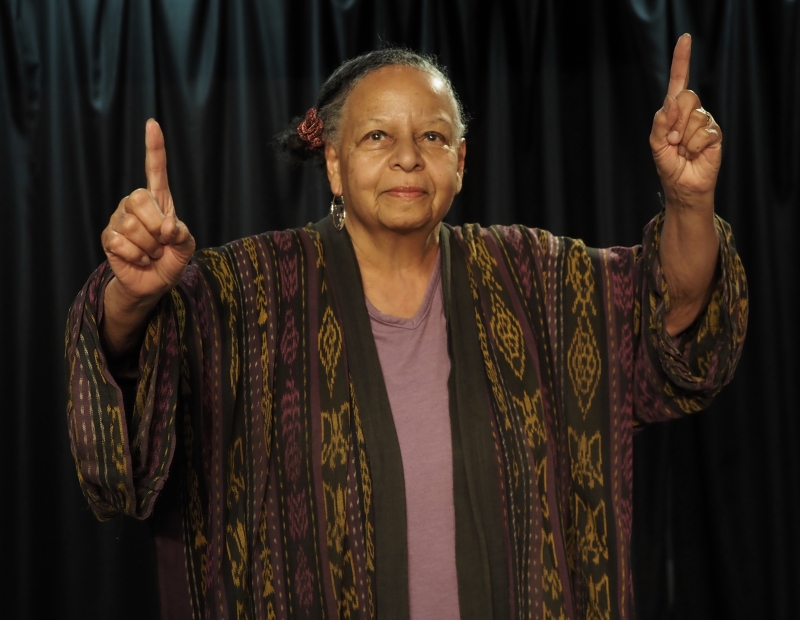
Act 3 Theatre’s DISARMING VENUS is comprised of a series of vignettes created and performed by women over 55 that deal with issues of beauty, aging, relationships, frustrating societal standards, and empowerment, all relating to an exhibit cataloguing the history of the depiction of Venus in art from Willendorf to de Milo. It’s a terrific opportunity to hear about the things that matter to a diverse group of older women, who rock this call to actions.
At almost 90 minutes of sketches, there’s a lot of overlap, which is a hazard of a collective creation where everyone gets to play and there’s no listed director or editor. The show is also hampered by difficult sightlines from the single-level audience and a stuffy space. When the observations ring true, though, they hit with precision and lived-in grace. Renowned puppeteer Nina Keogh’s interludes up the energy between sketches, serving both as connective tissue and a comic break from “Dr. Beryl Freud,” something like if Sex with Sue [Johanson] was hosted by a Muppet. If you missed DISARMING VENUS this time around, there's a second chance in Orilia on September 29th.
Photo of Rita Shelton Deverell by Victoria Ilgacs
SASKATCHEWAN: AN ASPIRATIONAL POLYAMOROUS ADVENTURE
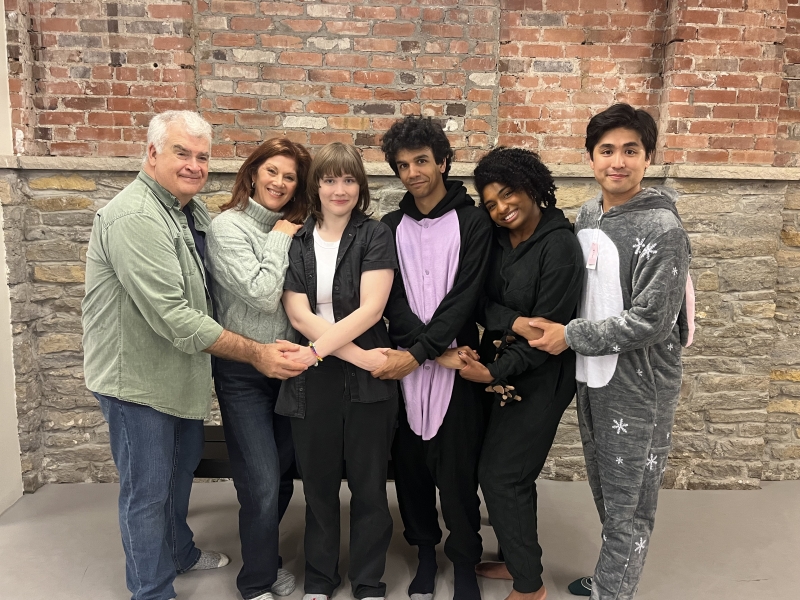
In a world filled with tragic queer stories, this soft play about young people in a polyamorous relationship who move to rural Saskatchewan for more space and find themselves uncertainly negotiating their first meeting with their older prairie neighbours (Dan Willmott and Maria Syrgiannis) is a quiet delight. Playwright Justin Hay’s gentle humour and sympathetic, generous viewpoint extend not only to the young lovers but to the older couple, who aren’t stereotypical in their responses to the poly crew’s chosen lifestyle while also feeling realistically skeptical. Wilmot and Syrgiannis’ initially oblivious reactions when finding a fursuit add another layer of comedy to the proceedings, which might otherwise start feeling a bit too mellow even with a little bit of conflict and some suggestive props.
The last member of the foursome who has refused to move with the rest could be a larger presence in the show, and everyone’s previous life could be a bit more fleshed out. But it’s nice to see a show where sexual identity is treated more as part of the farce than a potential tragedy, with reasonable stakes that nobody’s going to be burned at.
Photo of Dan Willmott, Maria Syrgiannis, Simon Sarnowski, Ben Chinapen, Naima Sundiata, Hidetaka Ishii by Ceilidh Hay-Valley
Photo of Dan Willmott, Maria Syrgiannis, Simon Sarnowski, Ben Chinapen, Naima Sundiata, Hidetaka Ishii by Ceilidh Hay-Valley
YOU, HAMLET
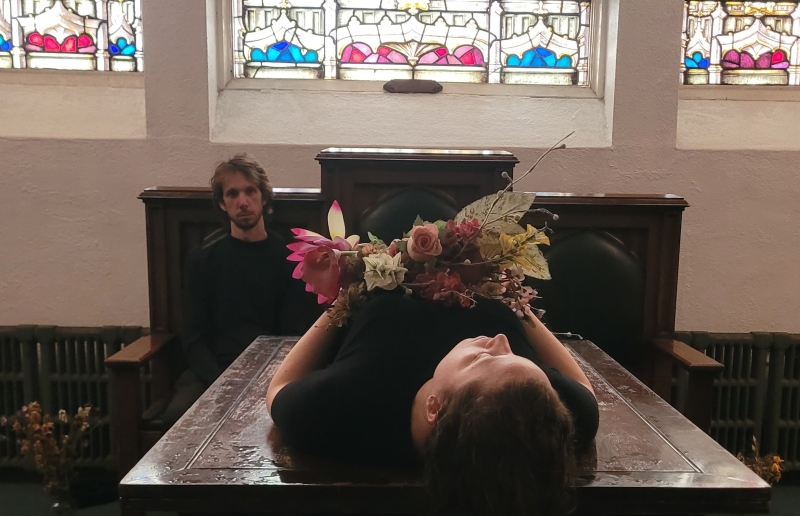
Hamlet adaptations have been relatively inescapable on Toronto stages this year, but DopoLavoro Teatrale’s production, half roaming site-specific installation and half academic discussion, is a unique take on the familiar story. Director Daniele Bartolini’s 90-minute show in East End United, a nonlinear collection of moments from the tragedy, demands thought and participation from its audience, and gives back in accordance with how much the 20 audience members put into it.
A certain amount of familiarity with the original text is necessary, as the production picks and chooses what to highlight, and takes us further and further from the original to layer on commentary tracks and psychological analysis. As the actors invite us to contemplate the way they’ve presented the characters and storyline, we’re treated to arresting images: the Ghost wandering around the sanctuary’s altar; Ophelia, wet hair dripping into a basin; Gertrude, holding your hands like a mother unwilling to let go of her child. Characters pop out from unexpected places, contrasting the more staid thought exercise sections with sudden physicality.
Where the show stands out is in its existential discussions of the issues and questions Hamlet has raised for centuries, questions about agency, legacy, fear, sanity, and death. These questions gradually decouple from a direct exploration of the play itself and into the audience members’ personal experiences and lives, though there is no requirement to share anything beyond one’s comfort. As our meditations become more and more self-guided, things have the potential to go awry, but it’s also cheering to see audience members step up as skilled facilitators. While the ending of YOU, HAMLET doesn’t quite bring things together in a satisfying way that interrogates and wraps up the whole experience, it’s a worthwhile visit into the Shakespearian subconscious.
Photo of Nolan Molfetta and Marta Zannoner by Melinda Mohammed
Reader Reviews
Videos

